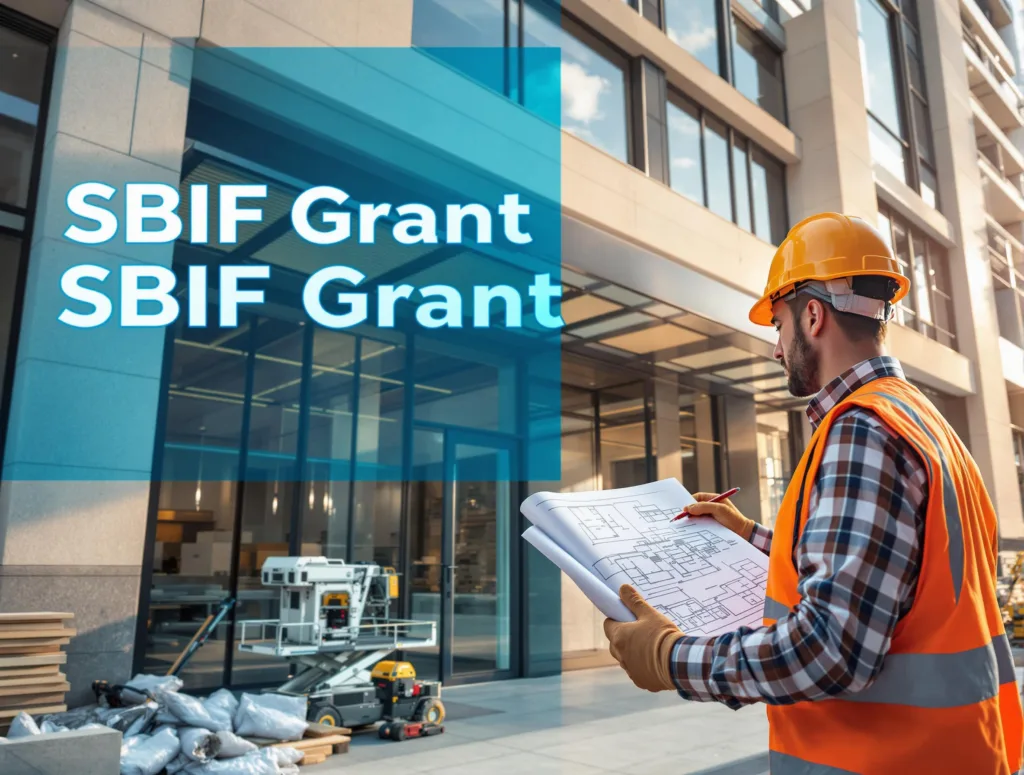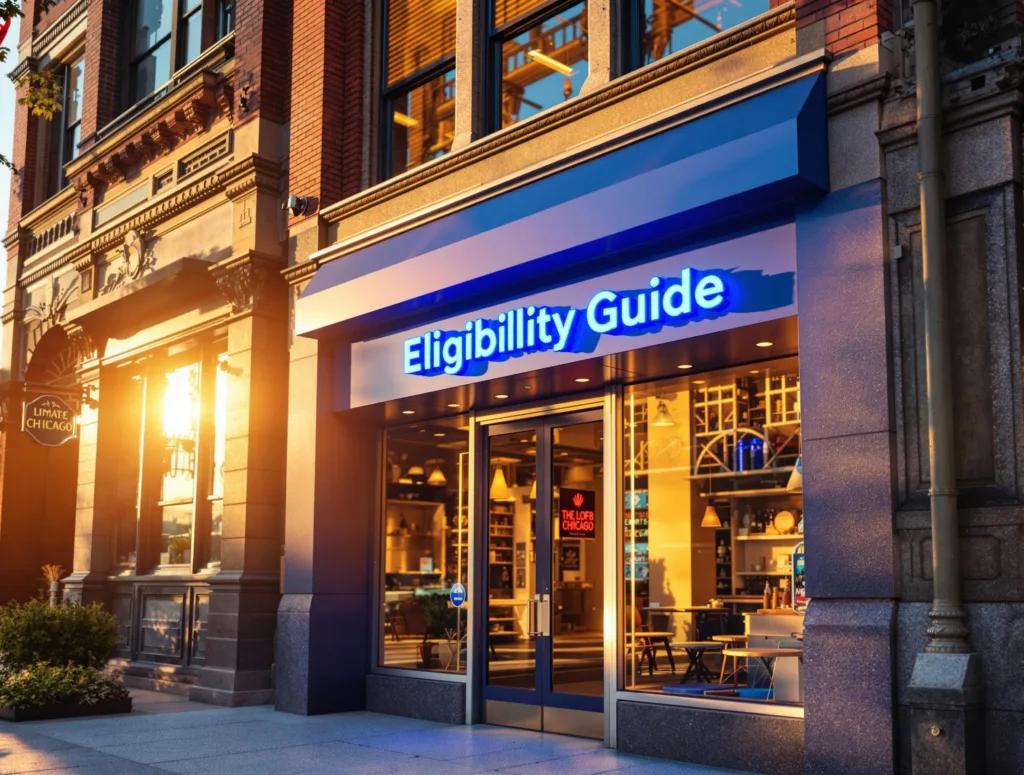Key Takeaways
SBIF grants cover up to 90% of improvement costs for eligible businesses
Industrial properties can receive maximum funding of $250,000 per project
Phased disbursement options available for managing project cash flow
Monthly application windows target specific Chicago TIF districts

Transform your Chicago business property with the Small Business Improvement Fund (SBIF), a powerful reimbursement grant program offering up to $250,000 for permanent building improvements. This comprehensive guide will walk you through everything you need to know about securing and maximizing SBIF funding in 2025.
Overview of Chicago’s SBIF Program
The Small Business Improvement Fund represents a strategic initiative by Chicago’s Department of Planning and Development to revitalize commercial and industrial properties across the city. Launched in 1999, this program has become a cornerstone of Chicago’s economic development strategy, offering substantial reimbursement grants for permanent building improvements.
The SBIF program stands out from other grant initiatives because it provides reimbursement up to 90% of project costs for eligible businesses, with no repayment required. This makes it one of the most generous building improvement programs in the United States.
Understanding Grant Amounts and Eligibility

Maximum Grant Amounts
- Commercial Properties: Up to $150,000 for single-tenant properties
- Industrial Properties: Up to $250,000 per property
- Multi-tenant Commercial: Up to $75,000 per tenant, maximum $250,000 per building
Reimbursement Percentages
For commercial businesses, reimbursement rates are tied to annual gross sales:
- 90% reimbursement: Sales under $3 million
- 60% reimbursement: Sales between $3-6 million
- 30% reimbursement: Sales between $6-9 million
Industrial businesses receive a flat 50% reimbursement rate, making this program particularly attractive for manufacturing and industrial property improvements. This can significantly reduce the cost burden of major facility upgrades.
Qualifying for SBIF Funding

Eligible Applicants
- Commercial Business Requirements:
- Located in an eligible TIF district
- Average annual sales under $9 million
- Must have site control (ownership or lease)
- Industrial Business Requirements:
- Maximum 200 full-time employees
- Located in eligible TIF district
- Property owners must meet net worth requirements
- Property Owner Requirements:
- Net worth under $9 million
- Liquid assets under $500,000
- Property must be in eligible TIF district
Start-up businesses can qualify for SBIF grants by providing detailed business plans and three-year financial projections. This makes the program accessible to new entrepreneurs looking to establish or expand their presence in Chicago.
Eligible Improvements and Expenses
Covered Improvements
- Roof and façade renovations
- HVAC and mechanical systems
- Electrical and plumbing upgrades
- ADA compliance modifications
- Permanent interior renovations
- Solar panel installations
Ineligible Expenses
- Equipment purchases
- Interior residential work
- New construction
- Cosmetic repairs
- Outdoor dining areas
- Landscaping
- Business-specific items
SBIF Grant Eligibility Checker
Find out if you qualify for up to $250,000 in improvement funds
What type of property do you have?
Tell us about your business
Is your property located in an eligible TIF district?
Strategic Application Process and Timeline

Application Windows by TIF District
The SBIF program operates on a rolling basis throughout the year, with specific application windows for different Tax Increment Financing (TIF) districts. This structured approach ensures fair distribution of funds across Chicago’s diverse business communities.
Pro Strategy: Sign up for SomerCor’s notification list to receive alerts when your TIF district’s application window opens. Many districts receive more applications than available funding, making early submission crucial.
Four-Stage Application Process
- Stage 1: Initial Eligibility (20 Days)
- Submit completed application during TIF district window
- Provide proof of site control
- Complete eligibility documentation
- Clear any outstanding city debt
- Stage 2: Project Development (120 Days)
- Submit two competing contractor bids
- Resolve any property tax issues
- Finalize project scope and budget
- DO NOT begin construction at this stage
Critical Point: Never start construction before receiving your Conditional Commitment Letter. Any work begun before approval is automatically disqualified from reimbursement.
- Stage 3: Project Approval (120 Days)
- Receive Conditional Commitment Letter
- Submit proof of project financing
- Obtain necessary permits
- Begin construction within allowed timeframe
- Stage 4: Reimbursement (4-6 Weeks)
- Complete construction work
- Submit proof of payments
- Pass final site inspection
- Receive reimbursement check
Innovative Financing Strategies

Phased Disbursement Option
SBIF offers a unique phased payment approach for qualified projects:
- Minimum project size: $50,000
- Up to three disbursement phases
- Each phase must be at least $25,000
- Requires proof of 50% total project financing upfront
Strategic Advantage: The phased disbursement option can significantly improve cash flow management, making larger improvement projects more feasible for small businesses.
Financing Requirements
To qualify for SBIF funding, applicants must demonstrate:
- Proof of Available Funds
- Bank statements showing sufficient capital
- Approved loan documentation
- Line of credit confirmation
- Matching Requirements
- Commercial: 10-70% depending on gross sales
- Industrial: 50% match required
- Evidence of financing needed within 120 days of approval
Maximizing Your SBIF Application Success
Strategic Planning Tips
- Documentation Preparation
- Current business tax returns
- Financial statements
- Property ownership/lease documents
- Contractor estimates
- Project timeline
- Project Scope Development
- Focus on eligible improvements
- Prioritize essential repairs
- Include required exterior improvements
- Consider energy efficiency upgrades
Strategic Planning: For projects over $25,000, allocate at least 10% to exterior improvements. This requirement can be waived if recent exterior work meets city guidelines.
Frequently Asked Questions About SBIF
1. How does the reimbursement process work?
The SBIF program operates on a reimbursement basis, meaning you must initially pay for all improvements. Once work is completed and verified, you’ll receive your grant funding within 4-6 weeks of submitting complete documentation.
Keep meticulous records of all payments, including canceled checks, contractor waivers, and permits. Having organized documentation can significantly speed up the reimbursement process.
2. Can start-up businesses apply for SBIF grants?
Yes, start-ups can qualify by providing:
- Detailed 36-month business plan
- Financial projections
- Proof of proper zoning
- Evidence of site control
- Demonstration of project financing
3. What happens if my TIF district has insufficient funds?
If demand exceeds available funding, applications enter a lottery system. Waitlisted applications remain active for 24 months, with priority given to:
- INVEST South/West Corridor projects
- Target Corridor developments
- Standard applications in order of lottery drawing
4. Can I combine SBIF with other city funding?
The maximum grant amount will be reduced dollar-for-dollar by:
- Direct City Financial Assistance received within 3 years
- Current city funding
- Committed future city funding
- Neighborhood Opportunity Fund grants
- Chicago Recovery Plan assistance
5. What are the property tax requirements?
All applicants must:
- Be current on property taxes
- Maintain tax compliance throughout the project
- Resolve any tax issues before reimbursement
- Submit proof of property tax payments
6. How long must I maintain my business after receiving funding?
Recipients must:
- Maintain an active licensed business for 3 years
- Keep ownership of the property for 3 years (if owner)
- Remain within the TIF district for 3 years (if tenant)
- Submit annual compliance reports
7. What improvements are ineligible for funding?
Key exclusions include:
- New construction or expansions
- Equipment purchases
- Cosmetic repairs
- Outdoor dining areas
- Landscaping
- Residential improvements
8. Can I make changes to my project after approval?
Material changes require DPD approval and may include:
- Scope modifications
- Budget adjustments
- Timeline extensions
- Contractor changes
9. What are the contractor requirements?
Contractors must be:
- Licensed in Chicago
- Properly insured
- Capable of providing competitive bids
- Able to complete work within timeline
- Compliant with city regulations
10. How does the phased disbursement option work?
Requirements include:
- Minimum total grant of $50,000
- Each phase minimum of $25,000
- Maximum of three phases
- Proof of 50% total project financing
- Complete documentation for each phase
Conclusion
The Chicago SBIF program represents a significant opportunity for business owners to improve their properties while preserving capital. Success requires careful planning, thorough documentation, and strategic execution. By following the guidelines outlined in this article and working closely with SomerCor, you can maximize your chances of securing and effectively utilizing SBIF funding.
Final Strategic Advice: Consider engaging a professional grant writer or consultant familiar with SBIF to review your application. The upfront cost often pays for itself through increased chances of approval and maximum funding allocation.

